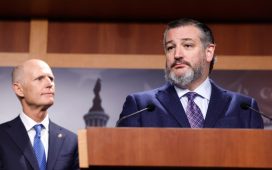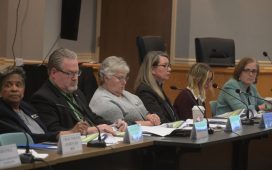Two more people have been indicted as part of an ongoing federal case focusing on adulterated and misbranded performance-enhancing drugs in horse racing. On March 11, a new superseding indictment was filed in the United States District Court for the Southern District of New York in the case of former pharmacist Scott Mangini, who has since entered a guilty plea to a charge of conspiring to unlawfully distribute adulterated and misbranded drugs with the intent to defraud and mislead. The new indictment also names Carl Garofalo Sr. and veterinarian Dr. Michael Posner.
This is the third version of an indictment for Mangini, who was originally indicted alongside associate Scott Robinson in March 2020 and then was named in a superseding indictment that dropped Robinson. Robinson pleaded guilty to one count of drug adulteration and misbranding conspiracy in September 2020 and was sentenced in March 2021 to 18 months in prison.
According to the indictment, Mangini collaborated with others, including Robinson and Garofalo, to operate a series of online marketplaces which advertised substances designed to enhance performance or serve as copies of prescription drugs. Court documents filed in Mangini’s case before his guilty plea detail the tangle of businesses Mangini and his associates created in an attempt to make it harder for consumers and regulators to work out who was behind their various storefronts.
Mangini apparently kept busy with multiple businesses operating on overlapping timeframes. As reported by the Paulick Report in 2016, Mangini was the pharmacist at Ergogenic Labs in Wellington, Fla., before the facility closed following a particularly negative inspection by state health department regulators. Mangini surrendered his license after that state inspection, which highlighted unsanitary facilities and mislabeled product ingredients. According to prosecutors, some of the products Mangini made at Ergogenic were sold to Robinson, who distributed them to the public via HorsePreRace.
During the same time he was working at Erogenic, Mangini, Robinson, and others were also making illegally-compounded ulcer medication under the banner of Horse Gold. Mangini, HorseGold, and HorsePreRace were all recipients of FDA warning letters in 2014 regarding ulcer products called GastroMax3 and Gastrotec which the agency said were illegally compounded. A series of knock-off omeprazole products on the market at the time had remarkably similar logos of a running horse outline with a starburst behind or near the horse.
One document from prosecutors acknowledged the same group was behind various iterations of the ulcer medication and were trying to walk a line between maintaining branding and escaping the notice of state authorities.
In November 2015, Robinson allegedly wrote to someone: “Don’t use that artwork for gastromax 3 that my guy sent u – u get us all ****ed – too close-why wouldn’t u use original artwork I’m serious-I don’t need board of pharmacy seeing that and linking to me.”
According to a press release from Horse Gold in 2011, its ulcer products were carried in racing tack shops around the country and were also donated to aftercare charities.
After Ergogenic shuttered in 2016, prosecutors say Mangini and Robinson stopped working together and Mangini and Garofalo incorporated Pegasis Investment Group, which served as a shell for RacehorseMeds. Garofalo is accused of helping to manufacture and ship “identical drugs to those Mangini had produced while operating Ergogenic” and of enlisting family members to do the same. Documents reveal that one of the people on the government’s witness list helped Mangini and Garofalo create a shell company called Diamond Enterprise Group to obscure the identity of the “true manufacturer and shipper of the drugs sold to consumers.” The person identified only as “Witness-1” was paid $1,000 a month and opened bank accounts and multiple mailboxes outside the state of Florida in the company’s name to make it appear as though Diamond Enterprise was based elsewhere.
Indeed, it would seem as though the scheme was successful at making it difficult for consumers to figure out how to report a problem with products purchased from one of the companies. A government motion told the story of an unidentified owner whose trainer advised her horse needed ulcer medication and directed the owner to RaceHorseMeds. The owner purchased omeprazole paste from the website without being prompted for a prescription and began giving the paste to her horse. Eight days later, she “observed a serious deterioration in her horse’s health, resulting in the horse’s hospitalization at an animal hospital.
“Witness-3 attempted to contact the company operating the Racehorsemeds website to find out what was in the product she ordered, but the only person Witness-3 could link to Racehorsemeds was Witness-1.”
Federal regulations require, among other elements of labeling, that the manufacturer of a drug be clearly identified on the label so consumers can report adverse drug reactions if needed.
Prior to entering his guilty plea, Mangini’s attorneys had been trading motions with prosecutors about which pieces of evidence would be admissible at his trial. One point of contention was that Mangini was apparently on the radar for U.S. Customs and Border Patrol. The agency seized two packages that were addressed to people other than Mangini – one in 2020 from Wuhan, China, was bound for “Frank Stef” and one in 2018 from Jalisco, Mexico, was addressed to “Michael O’Donnell.” A defense motion sought to have this evidence excluded, pointing out that Mangini was not the addressee on either package but did not explain exactly how he related to either package. The motion did point out that the accusations against Mangini related to his sale of products in the United States, not to his receipt of drugs from foreign countries.
Garofalo, Mangini and Robinson were all longtime owners on the Standardbred racing scene, but Mangini and Garofalo did make a foray into the Thoroughbred world. In late 2015, trainer Maria Borell claimed two horses for their Pegasis Investment Group. One was claimed away and the other was later transferred to trainer Sal Santoro after Borell left Florida. A third Thoroughbred racing for Pegasis Investment Group the following year was trained by Barry Kirkham.
The indictment accuses Posner of allowing Mangini to use his name and veterinary licensing credentials to create prescriptions for horses which neither Posner nor Mangini (who is not a veterinarian) had examined. The March 2021 indictment points to a check to Posner issued by Ergogenic Labs for $243.50, with “March 2016 commissions” written in the memo line.
Mangini and Posner were charged with one count of drug adulteration and misbranding conspiracy, while Mangini and Garofalo were charged in a separate count of drug adulteration and misbranding conspiracy. Garofalo and Posner have entered not guilty pleas.
New to the Paulick Report? Click here to sign up for our daily email newsletter to keep up on this and other stories happening in the Thoroughbred industry.
Copyright © 2021 Paulick Report.







